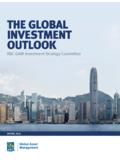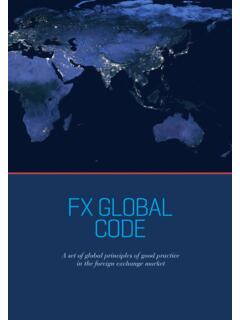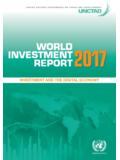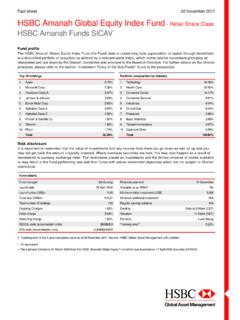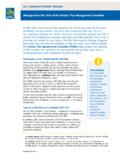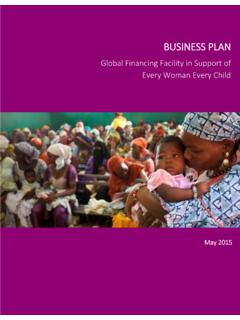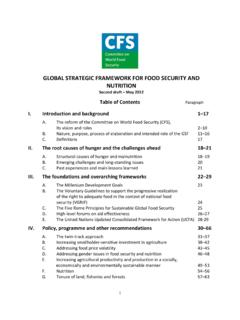Transcription of What We Are Talking About - morganstanleyfa.com
1 Please refer to important information, disclosures and qualifications at the end of this material. global investment COMMITTEE , 2018 LISA SHALETT Head of Wealth Management investment Resources Head of investment & Portfolio Strategies Morgan Stanley Wealth Management +1 212 296-0335 Upcoming Catalysts Aug. 22 US existing home sales Aug. 22 Japan All Industry Activity Index Aug. 23 US initial jobless claims Aug. 23 Kansas City Fed Manufacturing Survey Aug. 23 Euro Zone consumer confidence Aug. 23 US new home sales Aug. 23 Japan leading index Aug. 24 US durable goods orders What We Are Talking About Turkey and Stuff(ing). The markdown of the Turkish lira is unlikely to become a replay of the 1997-1998 emerging markets (EM) debt crisis; thus far, repricing of EM assets has been orderly, and most EM central banks have responded rationally; the situation should remind investors of the current risks surrounding the strong US dollar and, in turn, US assets; a strong dollar tightens global financial conditions and liquidity, artificially distorts and suppresses inflation, and reduces the global competitiveness of US exports; it also exacerbates tensions around trade policy; continued dollar strength would likely hasten a global slowdown; should the dollar weaken, market positioning and valuations suggest that US equities may not benefit.
2 Consider reducing passive exposure to global equities in favor of active management. Turkey and Stuff(ing) Every calendar year has its share of surprises and certainly one of 2018 s has been the return of extreme outperformance by US stocks versus the rest of the world. As the year started, many were calling for a continuation of the global synchronous economic recovery that had characterized markets in 2017, when non-US stocks finally led after a decade of US dominance. Instead, US equities have outperformed the rest of the world by some 1,300 basis points in US-dollar terms (as of Aug. 16). What happened to global equities? Political battles in the UK, Italy, Argentina, Mexico and Brazil have roiled markets; economic growth has been weaker than expected; a stronger US dollar has wreaked havoc on the emerging markets; and fears of escalating trade tensions hit China.
3 Against this backdrop, robust tax cuts and fiscal stimulus have driven growth in the US economy. After all, S&P 500 earnings have grown at close to 25% versus a year ago, the second quarter s GDP growth was the strongest in 14 years, stock indexes are approaching all-time highs and volatility remains subdued even though the Federal Reserve is tightening policy. Perhaps even more amazing is that despite an acceleration in core inflation to from a year ago, the 10-year US Treasury yield remains only 40 basis points higher The GIC Weekly Please refer to important information, disclosures and qualifications at the end of this material. Aug. 20, 2018 2 THE GIC WEEKLY than where it was at the start of the year and is comfortably below 3%, even with a forecasted doubling in the US budget deficit.
4 Nor has the markdown of Turkey s currency, the lira, which has fallen more than 40% since January, and the likely ensuing damage to its economy been enough to shake the US market. Why? The global investment Committee believes that the dollar strength has thus far bolstered US equities resilience. But how much longer will that dynamic hold? The situation in Turkey appears idiosyncratic, the result of a long developing and unsustainable policy by President Recep Tayyip Erdo an, that is now further complicated by a political standoff with President Trump. For much of the past decade, Turkey pursued growth with low-cost, dollar-denominated debt that fueled fiscal spending and ballooned the current account deficit, a cocktail that set up the potential for high inflation. As Erdo an has become increasingly authoritarian, he has taken control of the Ministry of Finance, putting his son-in -law in charge.
5 He has also removed the independence of the central bank, which makes it difficult to curtail currency outflows through a prudent interest rate policy. While this drama has raised anxieties About a replay of the 1997-1998 EM debt crisis, when a sell-off in the Thai baht triggered a severe bout of market volatility that sent global markets down by 35%, today, the global banking system is more insulated from EM debt. First, much less of the debt is from the sovereign borrowers and more from the corporations, so it is more decentralized and syndicated through capital markets. Second, while there are other vulnerable EM countries, like South Africa and Argentina, many more like India, Indonesia and China have been better managed, with aggressive central banks using interest rates to stabilize their currencies.
6 But US dollar strength has unequivocally been a weight on EM currencies and stocks (Chart of the Week, see page 3). The reason is straightforward. When currencies of countries with high amounts of dollar-denominated debt weaken, especially when interest rates are rising, the total cost of servicing the debt increases, causing a liquidity squeeze. Less liquidity means lower free balances with which to fuel credit growth and, ultimately, slower economic growth. In addition, a stronger dollar often means lower commodity prices, a critical revenue source for many EM exporters such as Brazil, Russia and South Africa. But as Hans Redeker, Morgan Stanley & Co. s currency strategist, points out in his Aug. 16 report, we may be approaching an inflection point where the slowdown in EM growth starts hitting the profits of US companies.
7 This situation could be worsened given the current extreme long positioning in the dollar by foreign investors. A second area where a shift in the US dollar could cause problems is in transmission of higher inflation to the bond market. Currently, consensus thinking is that a more aggressive Fed hiking policy is driving dollar strength. While real interest rates have increased, inflation expectations have remained anchored, helping to keep nominal rates in check. But if the dollar weakens and commodity prices rebound especially in oil, where supply/demand dynamics remain bullish inflation could surge, causing a bond market rout and, in turn, upending stocks. A final place where the strong US dollar is operative is in current trade dynamics. Although the Trump administration has vowed to reduce the US trade deficit, its unconventional policies have had the effect of strengthening the dollar, hurting US export competitiveness.
8 This has been particularly evident against the Chinese renminbi, which has depreciated by 7% this year. Although some have focused on China s need to defend its currency to prevent capital outflows and preserve its more than $3 trillion in reserves, the reality is that reserves have remained completely stable all year. The net effect of devaluation has been to restore China s relative competitiveness with other EM countries. This gives them more not less negotiating power. Every tick higher in the US Dollar Index creates headwinds for US companies who are already facing retaliatory tariffs. Bottom Line: Turkey s currency decline is likely to remain contained, but reminds us of the centrality of currencies to global capital market flows and outcomes in an era still dominated by the distortive actions of central bank Quantitative Easing.
9 So far this year, the strong dollar has been a headwind for financial conditions, EM assets, US exports and trade talks, though it has contained global inflation. We believe we are at a juncture where US assets and relative outperformance may depend on a range-bound dollar and where big moves either up or down could cause markets to downshift. Watch the US Dollar Index for indications of a reversal in currency markets. Consider reducing passive exposure to global equities in favor of active management. Please refer to important information, disclosures and qualifications at the end of this material. Aug. 20, 2018 3 THE GIC WEEKLY Asset Class Performance and Heat Map (as of Aug. 17, 2018) Asset Class Annualized Returns (%) Yield Valuation Volatility (%) Correlation to global Equities Cash YTD 1-Yr.
10 2017 Current YTM Current YTM Avg. YTM2 30 Days 20 30 Days 20 90-Day US Treasury Bills global Equities Current Div. Yld. Current P/E Avg. P/E2 US Large-Cap Growth US Large-Cap Value US Mid-Cap Growth US Mid-Cap Value US Small-Cap Growth US Small-Cap Value Europe Equity Japan Equity Asia Pacific ex Japan Equity Emerging Markets global Fixed Income Current YTM Current Spread Avg. Spread2 Short-Term Fixed Income US Fixed Income International Fixed Income Inflation-Protected Securities - - - High Yield Emerging Markets Fixed.






